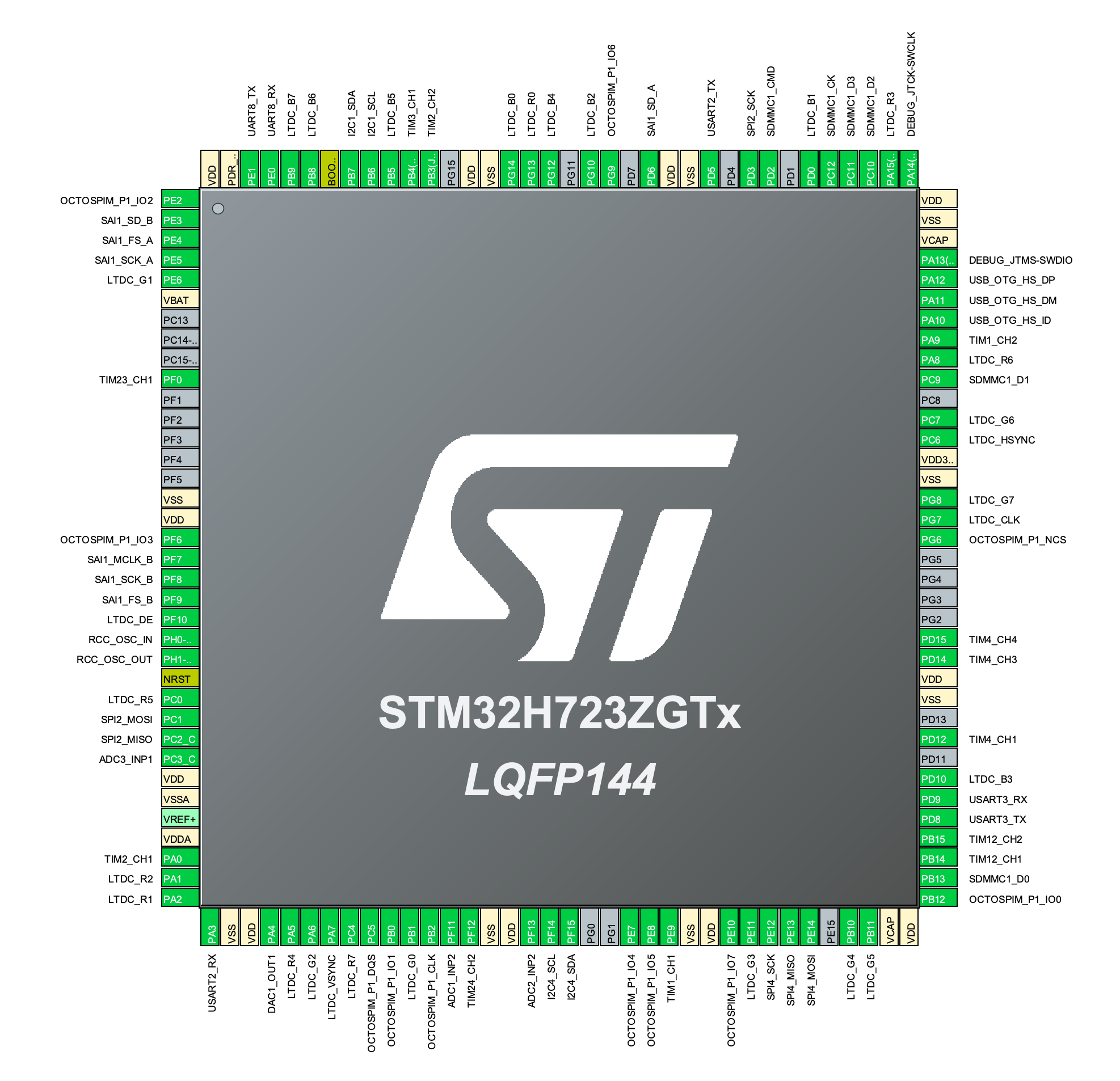KLST_PANDA MCU research

finding the right MCU for KLST_PANDA is not a trivial exercise.
in short: the winner is STM32H723ZGT
long version: MCU Universe of Madness. ST’s STM32 MCU options are … a lot and the differences are sometimes very, very subtle. don’t get me wrong: everything is well designed and presented. however, it is a very iterative process to choose features. what i found is that it is absolutely crucial to use STM32CubeIDE to literally activate every single feature in an actual project in order to determine if a MCU is suitable. there are a lot of limitation that are not always immediately apparent e.g in my preferred MCU ( STM32H723ZGT, 144-pin ) it is impossible to use the TFT driver ( in RGB88 mode ) in combination with a 2nd DAC channel or a second external memory controller.
i have looked into STM32H72x + STM32H73x MCUs only as they seem to meet most of the features we want to have in KLST_PANDA and are relatively cost efficient. i also wanted to use an MCU that is already available on a NUCLEO of DISCOVERY board from ST because i like to test the interaction of different modules ( SAI, USB, TFT) before i have the board manufactured.
i narrowed my research down to the STM32H7x5xGT + STM32H7x3ZGT branches of the familiy. all run at an amazing 550MHz and some come with a sizable internal FLASH and RAM memory. they also come with an Octo-SPI interface for external memory.
- STM32H7x5xGT ( see STM32H735G-DISCO, STM32H735IG ) 1M/564K, 550MHz “TFT-LCD, Ethernet, dual Octo-SPI with on-the-fly decryption, SMPS (for improved dynamic power efficiency)”
- STM32H7x3ZGT ( see NUCLEO-H723ZG ) 1M/564K, 550MHz “TFT-LCD, Ethernet, dual Octo-SPI with on-the-fly decryption”
- pin compatible with STM32H7x3ZGT
- STM32H723ZET 564K/564K ( pin compatible with STM32H7x3ZGT, smaller flash memory )
- STM32H730ZBT 128K/564K ( pin compatible with STM32H7x3ZGT, smaller flash memory )
i decided to go with STM32H723ZGT. it comes in a 144-pin, hand-solderable package. it is relatively affordable, has some pin compatible relatives. and is currently available in great numbers at JLCPCB.
below is a draft of a list of features that are possible to configure simultanously on a STM32H723ZGT MCU:
- 1× USB
- 1× TFT
- 1× SDCard ( 4-bit via
SDMMC1) - 1× external memory ( Octo-SPI/HyperRAM™ via
OCTOSPI1) - 1× SAI+I2C audiocodec ( via
SAI1) - 2× encoders ( via timers
TIM1+TIM2) - 3× UARTs ( via
USART2,USART3+UART8) - 1× I2C ( via
I2C1) - 2× SPI ( via
SPI2+SPI4) - 1× DAC
- 3× ADC
- 4× LEDs ( dimmable via one PWM timer
TIM4on different channels ) - 2× buttons ( with interrupts via
TIM12) - 3× GPIO PWM ( via dedicated timers
TIM3+TIM23+TIM24) - 23× GPIO
the only tiny bit of disappointment is that the MCU ( and the entire MCU branch ) only features a single USB controller.
during my research i found out that an LQFP100 version is not enough to host audio codec, memory, SDcard, TFT display + single USB interface at the same time ( e.g STM32H725VG ). whereas a LQFP176 would have too many unused pins and would potentially require too much PCB surface area.